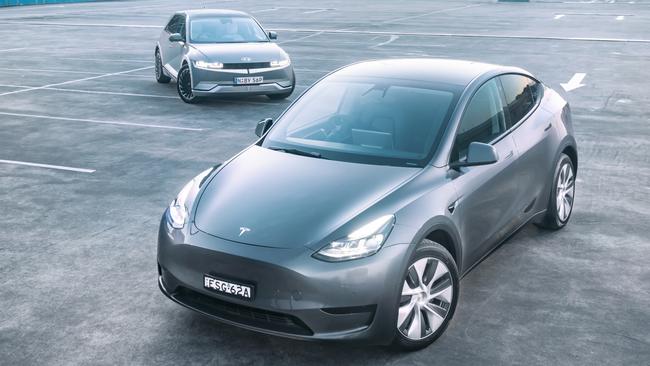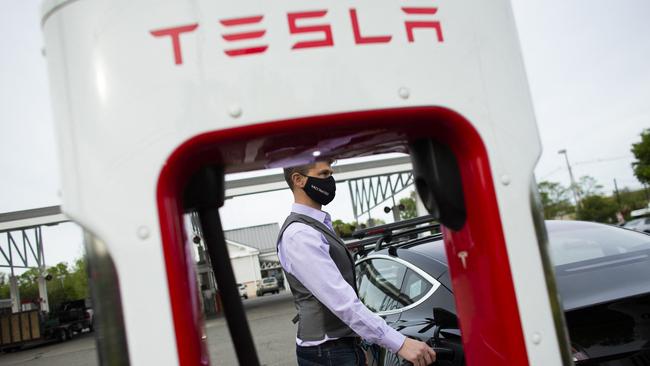Australia is a global laggard on electric vehicle policy, but we can learn from NZ, Tesla says
Tesla chair Robyn Denholm says Australia is still ‘hedging our bets with coal’ and needs to grasp a once in a century chance to turn its lithium wealth into a battery manufacturing industry.
You’ll know when Australia is serious about electric vehicles, Tesla chair Robyn Denholm says - because we’ll have a policy that looks a lot like New Zealand’s.
In a wide-ranging speech at the Australian Clean Energy Summit in Sydney on Tuesday, Ms Denholm also said Australia had a “once in a century opportunity” to turn its lithium wealth into a large scale battery manufacturing industry, and that we were still “hedging our bets with coal’’ despite a need to lean heavily into the energy transition.
The chair of the $US750bn Elon Musk-led electric vehicle and battery company said electric vehicles still made up only 2 per cent of new car sales in Australia.
“And that’s largely because we’re one of the only OECD countries with no fuel efficiency standards,’’ she said.
“So it’s no surprise that the cars on our roads are among the most polluting in the world.
“Australia currently accepts vehicles that the rest of the world doesn’t. They’re either too dirty or expensive to run.’’

Ms Denholm said she would not be surprised if Tesla doubled the number of its own cars on Australian roads by the end of the year, from about 26,500 now, but said more broadly the nation was in dire need of policy leadership at the federal level.
“It’s time for fuel efficiency standards in Australia, and they must be strong standards,’’ she said.
“I’m hopeful that the new federal government will bring Australia up to par and when they do, here’s how you’ll know that they’re serious - their standards will actually look a lot like New Zealand’s.’’
Ms Denholm said New Zealand was recently in a similar position to Australia, but had passed two “excellent” laws.
“The first was their clean car discount scheme, which has been in operation for just over a year, and the EV sales have nearly tripled.
READ MORE: BHP lifts iron ore guidance
“The second is sensible fuel efficiency standards which begin in earnest next year and we’ll see them catch up to Europe and other markets within six years.
“A clear demonstration from our closest neighbour of how we could achieve a similar outcome and as petrol prices continue to skyrocket it’s never made more economic sense to go electric.’’
Ms Denholm said as well as putting in place the correct policy settings, work needed to be done to streamline the process for connecting charging stations to the grid.
“We have the equipment, the capital, and increasingly the customers, but we’re being held back,’’ she said.
“Fast charging stations require upgrades to transformers on the energy grid. It isn’t complicated from a technology point of view ... but currently it can take over a year from application to grid connection.
“That’s four times longer than anywhere else in the region to serve the growing number of EVs on the roads that need charging.’’

On the lithium front, Ms Denholm said while Australia produced about half of the world’s raw lithium, it only supplied 7 per cent of the refined product.
“Will Australia be able to move further up the value chain to more refining, to large scale cell manufacturing? In my view, that’s a possibility.
“Australia will need state and federal governments alike that can work quickly to approve mining, refining projects, and to come to the world with a clear pitch for domestic refining and manufacturing.
“I have spoken with Minister (Ed) Husic and also (Catherine) King and federal as well as the state governments and they grasp the magnitude of this once in a century opportunity.’’
Ms Denholm said industry collaboration would be key to success in this realm, and the opportunity was massive with a 30 times scale up in battery needs by 2030.
“There must be industry collaboration,’’ she said. “This is a classic opportunity for public and private partnerships to change the shape of Australian economy.’’
On the broader theme of the energy transition, Ms Denholm said “the time for debate should be behind us’’, and it was time for action.
This meant investing into storage at scale, and grasping new technologies.
“We should not be supporting market mechanisms that are be being built to prolong the life of existing or, heaven forbid, enable new fossil fuel assets,’’ she said.
“Australia has set the target of 43 per cent emissions reduction by 2030, but we are still hedging our bets somewhat with coal just in case.
“While we can all understand the need to mitigate risk, we must do this by looking at forward-leaning technologies.’’




To join the conversation, please log in. Don't have an account? Register
Join the conversation, you are commenting as Logout